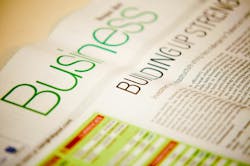Falsified Safety Training Records, DEI Programs and Post-Vacation Burnout: What We’re Reading This Week
I can’t tell you how good it feels to see the calendar and know we’re in March. The month has always been a harbinger for me, even if we might still get another snowstorm.
In January, I bought a cutting of a fiddle leaf fig, a plant I have long wanted but hadn’t wanted to pay the price for a mature plant. Fiddle leaf figs are fickle, and I lost two leaves within a week of bringing it home. Each day, when I opened the blinds, I looked at it and wondered if it would make it.
I went out of town last week. When I returned, I found to my utter delight that not one, but two new leaves had sprouted. I’m starting to see buds on my peperomia plants, too. Seeing new plant growth has buoyed my spirits.
Whether you’re a plant person or not, I hope you have found some ways to fill your cup and other things to be excited about lately.
We’re working on a number of projects at EHS Today that I hope you’ll like. But, if you ever have ideas for something you’d like to see or want to know more about, feel free to drop a line in the comments. Until next time, take good care of yourself!
Falsified Safety Training Records
Workplace fatalities are never acceptable, but this news is downright atrocious.
Last week, the Manhattan district attorney’s office charged a construction safety company and 25 individuals in a yearslong scheme that falsely certified thousands of workers as having completed required safety training. Worse, one of those workers slipped off scaffolding and died.
The company, Valor Security and Investigations, had become the third-largest safety training provider for construction workers in New York City. Valor certified that 20,000 laborers completed 40 hours of training, but the district attorney’s office believes most of those workers were never trained. As part of the investigation, the district attorney’s office said they uncovered a scheme whereby Valor worked with brokers to help workers obtain training certificates within days, often overnight.
Prosecutors said the company’s founder had “More than $1 million deposited into a personal banking account while he was operating Valor, mostly in several-hundred dollar increments that were consistent with how much he charged for the certificates” according to reporting from The New York Times.
The city’s buildings commissioner said the department has started an audit of Valor. If the company loses its construction license, those thousands of workers it certified would lose their certification. In March 2021, New York City passed a law that requires workers at most major construction sites to complete 40 hours of safety training.
You can read the full story here, and check back for updates from this ongoing investigation.
A Second Look at DEI Programs
In 2020, following outrage of the murders of George Floyd, Breonna Taylor and Ahmaud Arbery, many organizations spoke out about racism and inequalities in America. They pledged to do more to help more historically marginalized populations be brought into the fold and excel in the workplace.
That ushered in an onslaught of diversity, equity and inclusion (DEI) efforts. Those efforts have been curtailed or cancelled in the past several months, following the U.S. Supreme Court’s ruling to reject affirmative action programs in higher education.
Bloomberg’s Max Abelson, Simone Foxman and Ava Benny-Morrison have written a comprehensive look at what’s happening on Wall Street and what other influential corporations are doing. It’s a nuanced issue, to be sure, so I encourage you to have a read for yourself.
I’ll leave you with one comment that resonated with me: “The seemingly small changes — lawyerly tweaks, executives call them — are starting to add up to something big: the end of a watershed era for diversity in the U.S. workplace, and the start of a new, uncertain one.”
Read the full article from Bloomberg here.
Post-Vacation Burnout
It’s March, and that means spring break season is upon us. For those with school-aged children, you might be planning a little getaway. It sounds relaxing, but a new survey has found that many people experience burnout after taking time off.
MyBioSource surveyed over 1,000 American workers about burnout, and they found that a significant percentage of workers do not return from vacations refreshed. Instead, they found:
- 42% of workers dread returning to work after having time off;
- 41% of workers are currently experiencing post-time-off burnout, with 14% making mistakes due to exhaustion; and
- 34% of workers report that burnout typically sets in immediately after returning from their time off, and another 50% say it occurs within one week of returning.
Not everyone is equally affected by post-time-off burnout. More women experience it than men as do more Gen Z and millennials than other generations. Workers in certain industries ore professions are also more susceptible, with healthcare, educators and marketing professionals topping the list.
Perhaps the most concerning study finding is just how prevalent burnout is in the workplace—and just how few employers have initiatives or policies in place to address burnout, which, to be clear, stems from the organization but affects individuals.
“Employers may want to acknowledge this issue and implement supportive measures as needed,” the report concludes. “Additionally, employees should consider personal strategies to manage and prevent burnout. Moving forward, a collaborative effort is necessary to create a work environment where employees can return from time off feeling rejuvenated and ready to contribute effectively.”
Read the full survey findings, along with some popular burnout coping strategies, here.
About the Author
Nicole Stempak
Nicole Stempak is managing editor of EHS Today and conference content manager of the Safety Leadership Conference.

